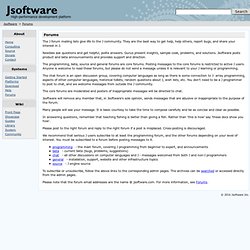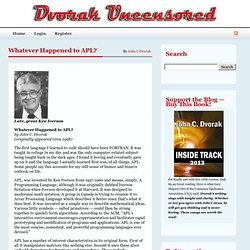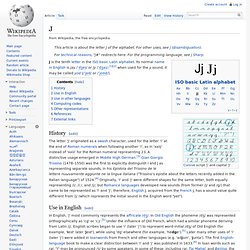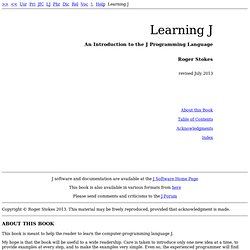

J Forums. The J forum mailing lists give life to the J community.

They are the best way to get help, help others, report bugs, and share your interest in J. Newbies ask questions and get helpful, polite answers. Gurus present insights, sample code, problems, and solutions. Jsoftware posts product and beta announcements and provides support and direction. The programming, beta, source and general forums are core forums.
The chat forum is an open discussion group, covering computer languages as long as there is some connection to J: array programming, aspects of other computer languages, historical tidbits, random questions about J, wish lists, etc. The core forums are moderated and posters of inappropriate messages will be directed to chat. Jsoftware will remove any member that, in Jsoftware's sole opinion, sends messages that are abusive or inappropriate to the purpose of the forum. Many people will see your message. Please note that the forum email addresses are the name @ jsoftware.com. NuVoc - J Wiki. Whatever Happened to APL? Late, great Ken Iverson Whatever Happened to APL?

By John C. Dvorak (originally appeared circa 1998) The first language I learned to code should have been FORTRAN. It was taught in college in my day and was the only computer-related subject being taught back in the dark ages. APL, was invented by Ken Iverson from 1957-1960 and means, simply, A Programming Language, although it was originally dubbed Iverson Notation when Iverson developed it at Harvard. APL has a number of interest characteristics in its original form. One other noteworthy feature is the power of computation that can be compressed into a single line of code. Some of the drawbacks to APL were corrected by the newer version of the language simply called “J.” — also developed by Iverson with Roger Hui. Doing a Whatever Happened to APL (or J) is somewhat ludicrous because nothing ever happened to the language.
This may change with the introduction of two products. Enter J. [note: Ken Iverson died in 2004] J Home. Guides - J Wiki. J. History[edit] Use in English[edit] In English, 'j' most commonly represents the affricate /dʒ/.

In Old English the phoneme /dʒ/ was represented orthographically as 'cg' or 'cȝ'.[5] Under the influence of Old French, which had a similar phoneme deriving from Latin /j/, English scribes began to use 'i' (later 'j') to represent word-initial /dʒ/ of Old English (for example, 'iest' later 'jest'), while using 'dg' elsewhere (for example, 'hedge').[5] Later many other uses of 'i' (later 'j') were added in loanwords from French and other languages (e.g. 'adjoin', 'junta'). The first English-language book to make a clear distinction between 'i' and 'j' was published in 1633.[6] In loan words such as raj, "J" may be pronounced /ʒ/ by some speakers.
In English, 'J' is the fourth-least-frequently used letter in words, being more frequent only than 'Z', 'Q', and 'X'. Use in other languages[edit] The letter J is generally not used in the modern Celtic languages and in Galician, except in loanwords. Learning Contents. >> << Usr Pri JfC LJ Phr Dic Rel Voc !

: Help Learning J J software and documentation are available at the J Software Home Page This book is also available in various formats from here Please send comments and criticisms to the J Forum Copyright © Roger Stokes 2013. This book is meant to help the reader to learn the computer-programming language J. My hope is that the book will be useful to a wide readership. The scope of this book is the core J language defined in the J Dictionary. Hence the book does not cover topics such as graphics, plotting, GUI, and database covered in the J User Guide, nor does it cover the J Application Library .